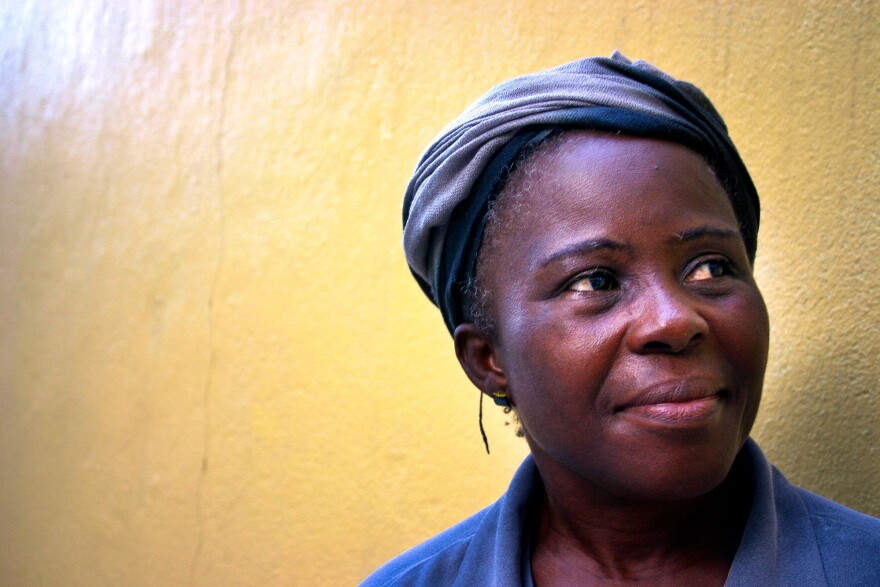In just two days, Liberia will celebrate what seemed an impossible dream last summer: the end of its Ebola outbreak.
Saturday, May 9 will mark the 42nd day of no new Ebola cases in the country. A person with Ebola typically shows symptoms within 21 days of exposure. But the World Health Organization adds an extra 21 days for extra caution before declaring that an outbreak has ended. So on Saturday, WHO officials and President Ellen Johnson Sirleaf will announce that Liberia is Ebola-free.
NPR's global health correspondent, Jason Beaubien, visited Liberia in August and October when Ebola was raging. He's back in the country for this milestone day, and he spoke with us about the mood there.
Are people thrilled beyond belief?
You would think this would be an incredibly joyous event. Most people are saying, "Yeah, this is great," but then they quickly add that it's a reminder of what an awful time this was, and how many people were lost.
Will there be a big party?
It's not going to be a huge celebration because there's still Ebola transmission in Sierra Leone and Guinea. Liberia feels it should have the big party once Ebola is gone from the region.
What are people saying about this achievement?
I interviewed Lucy Barh, a midwife we profiled earlier. Many of her colleagues got infected and died. She feels this is God smiling on Liberia. I hear that repeatedly. People who are religious are thanking God that Liberia is getting through this.
Who else are they thanking?
I'm hearing people talk about the importance of what happened in communities to turn the tide. The chief medical officer at Redemption Hospital was saying that without a change in people's mentality, Liberia was never going to get a handle on this outbreak.
People didn't believe Ebola was a real disease; they refused to bring loved ones in for care; they refused to stop burial practices that were incredibly dangerous. The mentality changed back in the fall after things got incredibly bad.
So people finally recognized the seriousness of the virus?
Yes, and there were community workers knocking on doors, telling people this is what you need to do: Don't touch people who are sick, get people to clinics early, wash your hands. The number of cases stopped going up and started going down to zero.
That's not happened completely in Sierra Leone and Guinea?
They've still got transmission. Some good things are happening there and some bad things. The latest WHO report has only 18 cases — nine in Sierra Leone, nine in Guinea. That's the lowest weekly total this year. So that's great.
The downside is that some of those cases are being found after people have died out in the community. So there was the potential they spread the virus in the community. And unsafe burials are continuing to happen, particularly in Guinea.
Are survivors in Liberia being stigmatized?
They're not being completely stigmatized, but they're not feeling like they're completely welcome back. Even if people know survivors are not supposed to be infectious, people are still a bit leery. Sometimes they don't shake survivors' hands. People are still keeping their distance.
The fact that Ebola can be transmitted sexually many months after someone is declared Ebola-free must add to the fears.
It makes people even more leery of believing that these people are completely free of the disease.
Are people willing to trust the word of medical authorities?
Not really. Let me give you an example. There's a measles outbreak going on at the moment — 562 cases and 7 deaths. You can attribute that to the lack of vaccinations during the Ebola outbreak — people weren't bringing their kids in for routine immunization. The government is about to launch a massive nationwide measles vaccination campaign. But just to show the level of distrust people have in the health system, there's a rumor that the measles vaccine is actually some kind of experimental Ebola vaccine. So the health ministry has to spend time refuting that.
Is the country suffering tremendously from the loss of so many health workers to Ebola?
At the moment, those lost health care workers have been replaced by foreigners sent in by the African Union and international aid groups. So there's not a huge gap. But when these groups pull out that's when Liberia will feel the loss. And you can't train replacements overnight. For instance, the head of the HIV program at JFK hospital [in Monrovia] died of Ebola. You can't train a doctor like that overnight.
In spite of all the mixed feelings, there must be a sense of pride in what Liberia has managed to achieve.
It is pretty amazing when you think about it: Liberia is the poorest of the three countries that had an Ebola outbreak. And though Liberia didn't have the resources of the other countries, it is going to be the first one to be declared Ebola-free. People are quite proud of what they accomplished.
Copyright 2021 NPR. To see more, visit https://www.npr.org. 9(MDAxNzg0MDExMDEyMTYyMjc1MDE3NGVmMw004))









